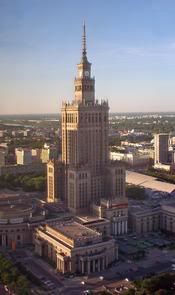Is free trade too much to ask?

Poland's demand that Russia play fair is burning up both Brussels and Moscow
The EU and Russia had been preparing the love fest for months. On November 24, representatives from Brussels and Moscow were to meet in Helsinki to hammer out a new partnership agreement. This “landmark” agreement was meant to strengthen the EU-Russia relationship, though exactly how was unclear.
Poland, however, had other ideas. Foreign Minister Anna Fotyga has made use of Poland's veto on the mandate necessary to launch negotiations. The move has officials in both Brussels and Moscow apoplectic with rage – and accusing Poland of blackmail, settling scores, and putting narrow national interest above the interests of the EU.
Forget that other more powerful EU nations have already committed those same sins – I wouldn't defend them either – the reality is that Poland's veto was the right move against a trading partner that is trying to manipulate the energy market for political gain, as well as sow disunity among EU members.
Poland has demanded that before it lift its veto, Russia must first either sign a transit protocol of the Energy Charter Treaty, which would open up Russia's gas pipelines to foreign competition, or ratify the treaty altogether, which would end state-controlled Gazprom's monopoly. Additionally, Poland demands that Russia finally lift its unjustified ban on Polish agricultural goods.
Both are issues on which the EU should support Poland. The food ban is little more than a thinly-veiled political slap in the face, as for a year Poland has made every effort to satisfy the Russians on the supposed “hygienic” criteria Russia says Poland's products do not meet. It's well-known that Russia's food-hygiene standards are far lower than the EU's, and yet Polish food products are exported to, sold in, and eaten in every EU member state. What is it about Polish food that isn't good enough for the Russians?
Window of opportunity
On energy, the EU has a slim window of opportunity now to force at least some movement on Moscow's obstinate stance on its gas market. The Kremlin, through Gazprom, has a stranglehold on all of Russia's gas exports, leaving those supplies open to political manipulation. At the moment, the EU is relatively immune to that manipulation, as it isn't yet totally dependent on Russian gas – but it soon will be. Russia hoped to bring that reality closer at the Helsinki talks.
Conversely, without the EU market to sell its energy to, Russia would be unable to fund its shaky economic recovery. By the time another chance to negotiate another “partnership agreement” rolls around, China may be just as big a customer as the EU, making Moscow better able to dictate terms. If the EU wants a dependable supply of gas free of political interference, it ought to insist on energy liberalization.
The current partnership agreement expires soon, but can be automatically extended. Moscow has much to gain from a closer relationship (it's hoping for endorsement of its WTO bid), the EU very little. The EU ought to take this opportunity to make sure Moscow treats each EU member with the same amount of respect, and diversifies its gas market, before it's too late.














5 Comments:
the biggest problem is Germany...
http://www.spacedaily.com/reports/Schroeder_Defends_His_New_Russian_Job.html
http://www.rferl.org/featuresarticle/2006/10/066e1ec5-017c-4891-b83c-0c5b80d6b5e2.html
....history repeats.
The cheek! http://today.reuters.com/news/articleinvesting.aspx?type=mergersNews&storyID=2006-11-16T170704Z_01_L16885811_RTRIDST_0_RUSSIA-EU-ACCESS.XML
I heard pray tell that France is supporting Poland vs. Russia.
France has expressed its belief that Russia should lift the food ban -- but has said it won't let that get in the way of a more expansive EU-Russia deal.
Lithuania, on the other hand, has expressed full support for Poland's blocking of the deal: link
The Russians should go screw themselves - they are just like Saddam's Iraq - an oil dictatorship kleptocracy.
Time to start self-rationing oil and gas to teach the primitives exploiting the deaths of micro-organisms millions of years ago for their own current gain is hardly the pinnacle of intellectual and industrial achievement.
The Russians are using the one thing that kept Communism going - natural resources - just to stay afloat - like Brazil it makes nothing and consumes everything
Post a Comment
< Main